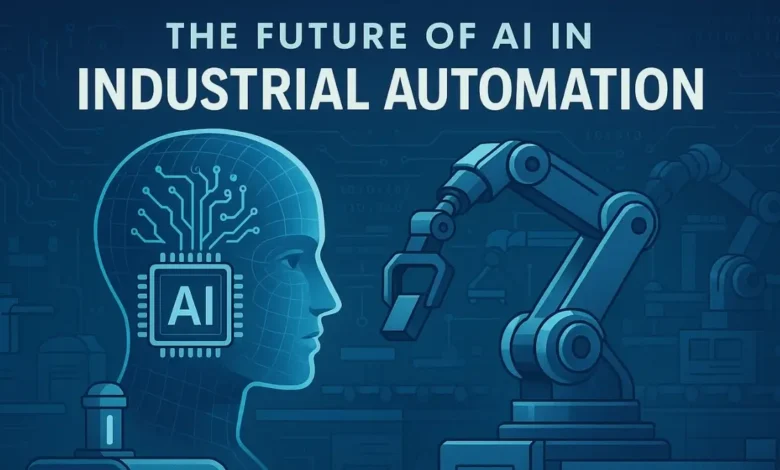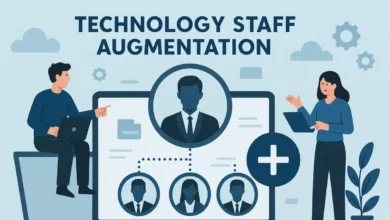AI in Industrial Automation Boosting Efficiency

The industry is going through major changes, and with AI as the driving force behind this change. AI for industrial automation more than an abstract concept, it has changed the way the supply chains, factories and even industries function. How do we know how AI manufacturing automation changing the world, and what will we see from the near future? This blog delved into the advantages, uses and the awe-inspiring possibilities of AI in the field of industry.
Table of contents
- The Benefits of Using AI in Industrial Automation
- AI in Industrial Automation Revolution Unfolds
- Increase Productivity by using Intelligent AI Tools
- AI in Industrial Automation Boosts Profits Fast
- The Hidden Power Behind Factory AI Systems
- AI in Industrial Automation Redefines Speed
- Unlock unlimited potential with Intelligent AI
- AI in Industrial Automation Slashes Downtime
- Control Markets by Using autonomous operations
- AI in Industrial Automation Powers Smart Plants
- Change the way you do business by implementing next-generation Artificial Intelligence
- Game-Changing AI Disrupts Old Workflows
- AI in Industrial Automation Fuels Innovation
- Make a Future Smarter using AI
- FAQs :
The Benefits of Using AI in Industrial Automation
The use of AI in industrial automation has been an industry-changing technology that will provide unbeatable advantages for businesses who adopt the latest technologies. So, Let’s take a look at how AI has changed the rules of game :
- Increased EfficiencyThrough automation of repetitive jobs, AI allows industries to work with speed and precision while reducing mistakes and saving time.
- Predictive MaintenanceSensors powered by AI monitor equipment’s health and predict issues before they occur, helping companies save millions of dollars annually.
- Cost savings:Automation can reduce operational cost by optimizing processes and the use of resources and energy.
- adaptability:AI responds to unpredictable demands and problems better than traditional methods.
- Data-driven decisions:By using the ability to analyze data in real-time, AI empowers industries to make better choices, typically within milliseconds.
- Increased Security:AI-powered robots and automated systems are able to take over risky jobs, and reduce workplace injuries.
The advantages clearly show the reason AI within the industry is accepted at a rapid rate.
AI in Industrial Automation Revolution Unfolds
The emergence of AI automation in industries is a sign of a new age. They are not only tools, they’re intelligent machines capable of analyzing, learning and changing. This transformational change is apparent throughout various industries like logistics, manufacturing, and agriculture. As an example:
- ManufacturingArtificially-operated robots are automated assembly lines that inspect the products with lightning speed to ensure the purpose of quality control.
- LogisticsSystems powered by AI ensure an efficient inventory management system that is seamless and improves routes for delivery to decrease the delivery time and costs.
- Agriculture AI is contributing to increased harvest on a large scale by improving automated planting. Drones keep track of the health of crops and smart irrigation.
This new era isn’t only concerned with automating processes, but rather innovating and bringing innovation to all aspects of industrial production.
Increase Productivity by using Intelligent AI Tools
A single of AI automation’s greatest assets is its ability to increase productivity. Here’s a look at how AI tools are helping to boost productivity in the industries they serve:
- Streamlined ProcessesAI makes sure workflows operate seamlessly, even in the most complex manufacturing processes.
- Dynamic Resource AllocationAI software forecasts the needs of resources and distributes resources with the highest efficiency feasible.
- Real-Time AdjustmentsThe intelligent AI algorithms adjust manufacturing processes instantly, guaranteeing high output but without losing the quality.
The combination of AI and industrial automation can lead to reaching previously impossible efficiency levels.
AI in Industrial Automation Boosts Profits Fast
Businesses that are implementing AI automation within their industries have seen their profits increase dramatically. An analysis by McKinsey found that businesses using AI are able to boost their profits up to 39% within just a few years.
Important factors for profit-making include:
- Low Operating CostsAI’s capabilities to optimize reduce the use of energy and reduce the amount of waste.
- customized productionAI is able to personalize production, developing custom-made products on a large scale, without adding prices.
- Market responsiveness:AI anticipates market patterns, allowing businesses to respond quickly and adapt to the needs of consumers efficiently.
As a result? The pace of growth is greatly accelerated in a changing and unstable market.
The Hidden Power Behind Factory AI Systems
The core of AI in automation of industrial processes lies in neural networks as well as machine learning. Data analysis operations and the construction of predictions are performed by machines. This is how they operate in factories:
- Pattern RecognitionArtificial Intelligence analyzes manufacturing data to discover inefficiencies, and recommend improvement suggestions.
- Control SystemsThe latest AI techniques automatically manage machines, improving accuracy and efficiency, while reducing the chance of the chance of errors.
- Digital Twins:Virtual simulations that are powered by AI enable industries to evaluate modifications to production lines, without having to stop the production.
The hidden power of this secret force drives industries towards higher accuracy and efficiency.
AI in Industrial Automation Redefines Speed
In our fast-paced, industrial world.AI-powered machines have been designed to improve the efficiency of every step of production. Look at the following examples:
- More efficient decision-making:AI algorithms analyze information in real-time and allow immediate modifications to processes.
- Rapider RepairsPredictive maintenance detects the potential for failures and fixes them before they happen, ensuring that production is continuous.
- streamlined supply chainsAI can reduce delays in supply chain logistics through optimizing the routes as well as scheduling and demand forecasting.
The speedier operations of industries means that they can adapt to changing market needs by demonstrating unbeatable speed and agility.
Unlock unlimited potential with Intelligent AI
AI automation in industry has many possibilities. With continuous improvement and learning, AI systems are breaking boundaries that appeared impossible 10 years ago.
- Smart PlantsThese factories that are powered by AI can make self-contained decision-making.
- Cooperative Robots (Cobots):Cobots are able to work with humans, and blend the human creative process with the machine’s efficiency.
- Global ScalabilityAI allows an encapsulated scaling process for industrial activities across all continents.
Firms that invest in intelligent AI can unlock huge commercial opportunities, and are gaining the marketplace.
AI in Industrial Automation Slashes Downtime
The downtime issue is among the most costly challenges for companies. A single interruption of 1% could result in the loss of millions in dollars. AI can put in place a stop to this disaster by offering solutions like:
- Predictive MaintenanceAI can predict equipment failures ahead of time and schedules maintenance to occur during periods that are not critical.
- Automated TroubleshootingIn the event of issues, AI diagnoses them instantly and suggests solutions to speed up repairs time.
- Failure PreventionAI algorithms alter machine settings in order to prevent malfunctions due to overuse or poor use.
Through reducing downtime, businesses are able to operate more effectively and earn more profit.
Control Markets by Using autonomous operations
Automated operations are not a dream of the future. AI-driven automation enables industrial units and factories to run using minimal human input. Its benefits are:
- Congruity:Automatic systems guarantee consistency in quality across each batch of production.
- ScalabilityThe plants can run all day long, without the risk of fatigue or error.
- cost efficiency:Fewer human resources are required, thus reducing the cost of labor.
By operating autonomously, companies have a competitive edge.
AI in Industrial Automation Powers Smart Plants
Smart plants are the pinnacle of AI automation in industries. The advanced plants combine IoT gadgets, AI algorithms, and big data analytics to deliver astonishing results.
- Real-Time MonitoringSmart sensors continuously communicate to keep track of every part of the plant’s operations.
- energy efficiency:Artificial Intelligence optimizes energy usage, while minimizing the environmental footprint while reducing utility bill.
- The ability to be flexible:Smart plants adapt to changing demands, dramatically decreasing time to market.
The pace of change has transformed industries and set new standards in effectiveness and sustainable development.
Change the way you do business by implementing next-generation Artificial Intelligence
The new generation of AI automation for industry will bring more advanced technological advancements. From quantum computing powered AI machines to robotics that are ultra-intelligent The future is full of possibilities of change. Businesses that take advantage of these advances can redefine their capabilities and ensure long-term viability.
Game-Changing AI Disrupts Old Workflows
AI changes workflows through getting rid of inefficient processes and creating efficient, automated processes. Some of the major disruptions that AI brings are:
- Automatic Quality ControlAI automation ensures consistently good product quality throughout the entire production line.
- Smarter SchedulingAI schedules shifts to ensure optimal utilization of both machine and human resource.
- Reporting Effortlessly:Automated reporting powered by AI decreases the burden of administrative tasks.
Breaking away from the old methodologies, AI offers industries a contemporary, streamlined method of operation.
AI in Industrial Automation Fuels Innovation
AI is driving innovation across industries worldwide. AI-powered technologies allow:
- Customized Product Development:AI can help industries develop to test, develop, and improve products with unprecedented speed.
- Collaboration across SectorsAI can bridge the gap between diverse industries, opening up new partnerships.
- SustainabilityArtificial Intelligence helps businesses reduce emissions, decrease waste as well as adopt environmentally friendly practices.
In its genesis, innovation, AI is catalyzing a healthier, greener future for industrial processes.
Make a Future Smarter using AI
The future of AI to improve industrial automation will be much more than just automation. it will be a total revolution in the world of industry. With the help of AI technology, companies will improve efficiency, decrease expenses, and get advantage in competition while gaining unlimited possibilities to innovate.
Are you prepared to participate in this AI revolution in business? Explore the ways AI will transform your processes. Find game-changing strategies that are specifically designed for your organization and remain one step ahead.
FAQs :
Why is AI suddenly important for factories?
Factories now collect massive amounts of data via sensors. AI excels in locating the patterns hidden in these information. This allows smarter choices and increases efficiency.
Do you think AI simply break less frequently?
Beyond simple alerts, AI predicts failuresprior tothey even occur. It evaluates temperature, vibration as well as sound. This helps to avoid expensive downtime and unexpected surprises.
How does AI improve product quality?
AI vision systems analyze items more quickly and with greater precision than human eyes. They can spot tiny imperfections that human eyes fail to notice. It drastically decreases the amount of waste and also reduces recalls.
Are robots becoming more intelligent with AI?
Yes. AI allows robots to adjust in real-time. They are better at handling unpredictable circumstances. This means they are more secure and much more effective in conjunction with human employees.
Can AI help manage my supply chain?
Absolutely. AI predicts the demand for materials and requirements more accurately. It can optimize inventory levels as well as the delivery route. It reduces costs and eliminates delay.
Can AI be able to replace factories workers?
Not entirely. Automating routine tasks as well as analyses. The workers are able to move into higher-value positions including taking care of AI and complex issues as well as maintaining.
What’s the longer-term plan for AI in manufacturing?
Absolutely “self-optimizing” factory. AI constantly analyzes every aspect. The system automatically adapts its processes to ensure the highest efficiency, high quality and a highly-personalized product.

